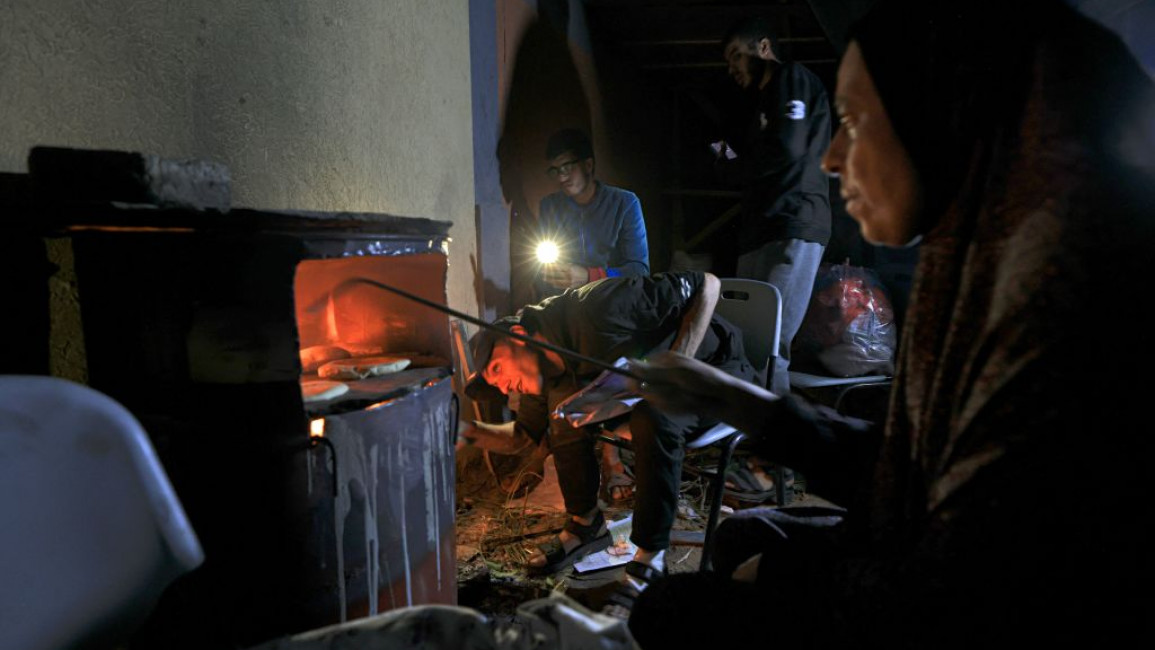North Gaza: living hell for thousands trapped by Israel army
Gaza -- As Israel and Hamas have agreed to a four-day truce and prisoner swap deal, the fate of tens of thousands of people trapped without food, electricity or clean water in now Israeli-occupied north Gaza remains unknown amid a total communications breakdown.
Civilians in the north of Gaza that The New Arab was able to reach through patchy internet spoke of being stuck in a living hell for the past few weeks, reporting nightmarish conditions, the smell of rotten corpses and exploded munitions, and a total Israeli military siege of the schools and hospitals they have been sheltering in.
Walaa Abu al-Meaza, a young woman from Beit Lahia, survived with two brothers what she said was an Israeli massacre against her family while they were in their home.
“We have not seen any electricity, water and food for two weeks. We are waiting for our fate as the Israeli occupation encircles us and attacks everything in our territory,” the 34-year-old mother of three told TNA.
For weeks, the Israelis encircled Gaza City and the north of the besieged coastal enclave, cutting it off from the southern part of the territory and continuing its ground military invasion.
As most international organizations have lost contact with their teams in the north, there are no accurate assessments of how many civilians remain trapped there. The United Nations estimates that there could be as many as 300,000 internally displaced people still stuck in northern Gaza, including Gaza City. UNRWA estimated 160,000 civilians could be sheltering in its schools in the north.
Israel has, through attacks and other measures, cut off all communications in the area.
Locals who spoke to TNA also spoke of their trauma as Israeli forces continue to attack indiscriminately.
"The situation in the Gaza Strip is so catastrophic and indescribable. People are hungry and thirsty, and we are dreaming of being able to have something to eat. Every day, when we get up in the morning, we seek any food that will keep us alive" https://t.co/rfkIzmapYB
— The New Arab (@The_NewArab) November 22, 2023
“Even when we want to ask for some help, we have not had any communications; all our mobile phones lost their charges amid the electricity cut off,” Walaa said. “We tried several times to evacuate our house as the army ordered us, but they opened their fire at us.”
“We saw death dozens of times every day.”
Walaa said the Israeli army attacked her residential block with dozens of rockets and killed more than 60 people.
“I heard a huge explosion around me and before recognizing what was happening, I fell on the ground and felt that all our house was destroyed on top of us,” she explained to TNA.
“When I opened my eyes, I saw my brothers around me. They were not moving. I was wounded. I could not move too. Some people arrived and tried to rescue us.”
Walaa and her brothers were transferred to the Indonesian Hospital in the north of Gaza on donkey carts.
“We do not have any communication to call the medical staff or even the international rescuers nor fuel in our cars to transfer the casualties to the hospitals,” Mohammed al-Masri, a Beit Lahia resident told TNA.
Israel's siege of Gaza's hospitals has left thousands stuck between life & death, none more so than dozens of premature babies. Yet Israel's misinformation campaign to deflect blame for their perilous fate has also failed. @saoudkhalaf_ reports ⬇ https://t.co/l09bJ4yauJ
— The New Arab (@The_NewArab) November 22, 2023
Since Israel cut off communications in Gaza and north of the Strip, medical crews have been unable to reach the casualties.
"Locals cannot call us to ask for help," Monir al-Bursh, the director of the Gaza Health Ministry said to TNA.
“We were told dozens of dead people were strewn on the streets, but we cannot recover them because of the Israeli strikes, fuel outage and communication breakdown.”
International groups like Doctors without Borders (MSF) have attempted to rescue casualties and provide primary medical services on the ground but they have sionce lost all contact with all field workers in Gaza and north of Gaza.
“The locals in the north of Gaza live in a dire situation, and the conditions there are catastrophic,” a coordinator of Doctors Without Borders said in a brief statement.
Since October 7, Israel launched a large-scale bloody war in the impoverished coastal enclave after Hamas, the Islamist group governing Gaza since 2007, carried out a surprise attack on Israel.
Israel has attacked and besieged hospitals and schools in Gaza and the northern parts of the Strip, where civilians have been sheltering in the tens of thousands.
“Israel is committing all war crimes against Gazans and it must be delivered to the international criminal court to be punished,” Ismail Thawabta, the director of the government media office in Gaza, told TNA.
Thawabta added that “since the beginning of the current war, Israel killed more than 14,000 Palestinians, including over 5,000 children, and wounded over 30,000 others, most of them were inside their houses.”



